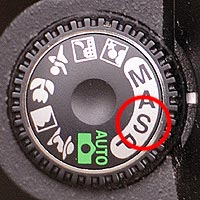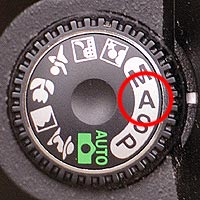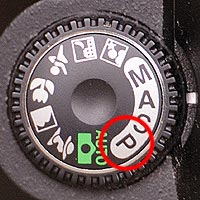| THE DIGITAL PHOTOGRAPHY SITE - TIPS AND TRICKS TO HELP ALL PHOTOGRAPHERS TAKE BETTER PHOTOS | search site |

|
Camera modes explained -
There's a possibility you've never even noticed your camera, or phone, even has camera modes.
|
If all you do is load up the camera app on your phone, or just turn your camera on and then simply get on with it, you are probable using the 'automatic' shooting mode.
Nothing really wrong with that - it probably takes a half decent photo most of the time.
Dig a bit deeper to find the camera modes
They're in there somewhere, buried in the settings menus.Once you've found them, the next question might well be, what are they all for?
Good question!
Here I've gone through the main shooting modes you're likely to find so that you'll know which one to use, when to use it, and what the camera, or phone, is doing 'under the hood'.
First of all, a little bit of explanation about exposure will help. I'll keep it simple on this page, but here's where you can find out more about understanding exposure if you wish.
So, some basics ...
There are three things that control exposure on your camera or phone:- the shutter
- the aperture
- and the ISO
- The shutter - your camera has a shutter which opens, exposes the image sensor to light, and then closes again.
- The aperture - this is a hole in the lens that can get larger, to let more light in, or shrink a bit to let less light in.
So ... if you make the aperture bigger, the shutter speed has to get smaller to compensate.
How is this relevant to camera modes?
 Well, one of the most common camera modes is shutter priority (sometimes called 'time value').
Well, one of the most common camera modes is shutter priority (sometimes called 'time value').
If you have a camera phone it's probably just called shutter priority.
If you have a digital SLR it might be labelled 'S' or maybe 'Tv' (for time value) - they mean the same thing.
If you choose this shooting mode here's what happens:
- You choose the shutter speed
- The camera will choose the correct aperture to match your shutter speed
- Done!
 What could be described as the opposite of this is Aperture priority.
What could be described as the opposite of this is Aperture priority.
If you have a camera phone it's probably just called aperture priority.
If you have a digital SLR it will be labelled 'A'.
If you choose this shooting mode here's what happens:
- You choose the aperture
- The camera will choose the correct shutter speed to match your shutter speed
- Done!
 Then there is a third option, and this is the one many people stick to ...
Then there is a third option, and this is the one many people stick to ...
... auto, or, on a digital SLR camera, probably called program, or just 'P'.
If you choose this shooting mode here's what happens:
- The camera chooses an appropriate shutter speed AND aperture for the scene
- Done!
Auto is the simplest camera mode to use, but is the most restrictive
Because you, the photographer, have no control over what the camera decides is the best shutter/aperture combination, Auto leaves you at the mercy of the camera to get the exposure right.Finally, there's the complete opposite of auto - manual mode.
If you choose this shooting mode here's what happens:
- You choose the aperture
- You choose the shutter speed to go with it
- The camera will let you know if the photo will be over, or under, exposed
- You choose to ignore the over/under exposure advice or make changes to your settings
- Done!
Camera modes - part 2 ⇒ ⇒ ⇒
|
| Subscibe to my monthly newsletter |

| |
|
Photographers produce the most amazing images - find out how this picture was taken... |
|
Top 5 most popular pages: |
Content, design and layout is Copyright© 2006-2015 by Darrell Payne, digital-photography-tips.net All rights reserved. Reproduction in whole or in part in any form or medium without the express permission of digital-photography-tips.net is prohibited. Contributors to this site agree to grant an exclusive, royalty-free, irrevocable, transferable, perpetual licence to publicly display submissions on this web site and in any publication produced by this web site. |
|||
